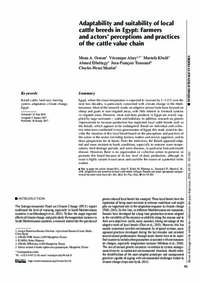Adaptability and suitability of local cattle breeds in Egypt: Farmers and actors’ perceptions and practices of the cattle value chain

Authors:
Egypt, where the mean temperature is expected to increase by 1−1.5°C over the next two decades, is particularly concerned with climate change in the Medi- terranean. Most of the research works on adaptive animal traits have focused on sheep and goats in non-irrigated areas, with little interest in livestock systems in irrigated areas. However, meat and dairy products in Egypt are mainly sup- plied by large ruminants − cattle and buffaloes. In addition, research on genetic improvement to increase production has neglected local cattle breeds such as the Baladi, which appears to be endangered. Based on individual and collec- tive interviews conducted in two governorates of Egypt, this study aimed to des- cribe the situation of this local breed based on the perceptions and practices of the actors in the sector (including farmers, traders and service suppliers), and to draw perspectives for its future. From the interviews, the Baladi appeared adap- ted and more resistant to harsh conditions, especially to extreme warm tempe- ratures, feed shortage periods, and some diseases, in particular foot-and-mouth disease. However, there is no organization or collective action to preserve or promote this breed because of its low level of dairy production, although its meat is highly valued in rural areas and could be the source of a potential niche market.
